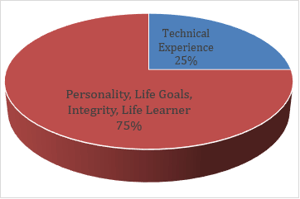Recently, I have been contemplating the impact of our college teaching styles on the future of our workforce. With technologies and global needs changing so rapidly, what should undergraduate programs[1] foster to prepare graduates for the future needs of the workforce? On a professional level, this has been instigated by our company’s recent search for new employees. On a personal level it comes from being the parent of three young adults who will be entering the workforce in the coming years, as well as discussions with two of my siblings who are college educators.
In my college experience, my classes almost exclusively consisted of passive learning – a professor lecturing to the class. Through my kids and siblings, I am hearing about colleges that are testing new ‘active’ teaching styles in an attempt to better prepare graduates for the (potentially undefined) future job market. My professional hiring experience has made me contemplate what traits make for a resilient, successful employee in a changing, unpredictable world. And what should we, as parents, educators, and internship-providers, be teaching our young adults in order to prepare them?
The More Things Change, The More They Stay the Same
Over the last twelve months, our small engineering firm has grown from nine people to thirteen. For many businesses, this is still small, but for our close-knit open office, this has a big impact on everything from our individual workload to our office culture. While looking for engineers, a project coordinator, and a versatile administrator/office manager we, naturally, tried to identify the qualifications and experience that told us if an applicant had the technical skills required to be successful in the position. Ultimately, we picked people that came with enough experience that we were confident they would quickly come up to speed. But during these interviews, I realized  there was so much more to consider than just the technical skills that first piqued our interest. In fact, if I had to put a percentage on it (and, because I am an engineer, of course I do!), I would say, of the qualifying applicants, about 25% of their compatibility with the role was based on their experience. The remaining 75% came from their soft skills and personality, their integrity and intelligence, their personal motivation and curiosity. If these qualities were exhibited in their personal lives through their cover letter, resume, and interview, we knew they would be quick learners and would fit into our work culture.
there was so much more to consider than just the technical skills that first piqued our interest. In fact, if I had to put a percentage on it (and, because I am an engineer, of course I do!), I would say, of the qualifying applicants, about 25% of their compatibility with the role was based on their experience. The remaining 75% came from their soft skills and personality, their integrity and intelligence, their personal motivation and curiosity. If these qualities were exhibited in their personal lives through their cover letter, resume, and interview, we knew they would be quick learners and would fit into our work culture.
Will This Interviewee Fit In?
At Cx Associates we interact with each other all day, every day of the week, in our collaborative-feeling office. We work closely together on projects, where an engineer is a Project Manager on one contract and an engineer on the next. This ensures that we all continuously work together and learn from one another. In addition, because we are a small, mission-driven organization, we collectively select the kinds of projects on which to propose based on our mutual values and vision for our company. All this makes for great teambuilding, but it also means we better share the same vision and we better like working together!
What Does Resiliency in the Workforce Look Like?
This hiring experience has given me the opportunity to think more holistically about what the workforce of today and tomorrow truly needs.
Through my sibling, I discovered a book called Creating Impact Through Future Learning, by Filip Dochy and Mien Segers, which lists the following traits as critical skills for teachers to cultivate:

Dochy and Segers recommend that educators focus their teaching styles on these traits to support resiliency in a workforce for an undefined future. We don’t know what types of jobs or work-place paradigms will be created by tomorrow’s technological advancements and global issues, such as climate change and population growth, and these qualities will enable graduates to adjust to the changing world. As an employer, I couldn’t agree more. As a parent, I hope I have taught – or at least assisted in teaching – these qualities to my kids.
What Should Colleges Teach for the Future?
The time of passive learning – where an educator gives a lecture in front of a class – should be minimized. Kids are comfortable learning much of the information currently taught this way through various online sources. Class time could be better spent completing project work in  teams in order to solidify their technical learning while practicing communication, presentation, and interpersonal competencies. This active style of learning is more engaging, which means the material is more likely to be embodied, and it has been shown to lead to a life-long interest in learning. Graduates with such skills and drive will be able to adapt to new careers and work styles. They will remain flexible, because they are used to taking an active role and thinking outside the box, while focusing on life-long learning. This is very exciting for our young people and very rewarding for the employers.
teams in order to solidify their technical learning while practicing communication, presentation, and interpersonal competencies. This active style of learning is more engaging, which means the material is more likely to be embodied, and it has been shown to lead to a life-long interest in learning. Graduates with such skills and drive will be able to adapt to new careers and work styles. They will remain flexible, because they are used to taking an active role and thinking outside the box, while focusing on life-long learning. This is very exciting for our young people and very rewarding for the employers.
We, at Cx Associates, are very lucky to have found wonderful young professionals who are versatile, intelligent, and curious and who embody the valuable traits suggested by Dochy and Segers. They will quickly learn the technical skills required to be successful in our particular niche and they bring positive energy, which creates a great vibe in our office. If more colleges can adopt the active learning paradigm, I think we will get more of these types of star employees, and that is very exciting for our future. We urgently need creative, entrepreneurial, motivated people with problem-solving skills who can generate new ideas to help solve the world’s problems.
[1] This includes trade schools, colleges and universities.


